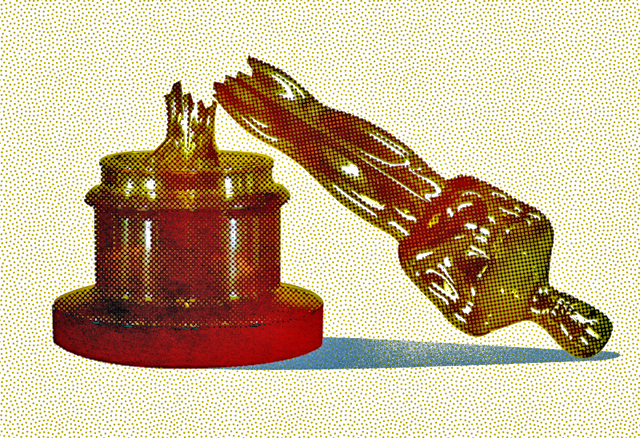
The Academy Awards has come under fire many times for feeling out of touch with the movie going public, but this year has been particularly brutal for the presenters of the prestigious Oscars. For the second year in a row, we have all of the acting nomination slots completely filled with white performers, with no people of color represented. Is it unfortunate? Of course it is. Is it representative of a racist attitude on the part of the academy? Hardly. The unfortunate aspect of the Academy nominating process is that they have only a tiny amount of slots to fill and sometimes many worthwhile performances will be left out. I believe that it has more to do with what kinds of movies Hollywood is able to make each year, and few if any focus on non-white subjects, at least as far as high profile projects. Of the movies this year that focused on a non-white subject that I felt deserved more recognition from the Academy, I would say that Creed should’ve gotten more in the way of nominations. But, at the same time, I don’t hold it against the Academy either. If you look at the whole history of the Academy Awards, they have only ever gotten it right a small percentage of the time. Despite being the highest honor the industry can bestow, the Oscars have also been responsible for making some questionable choices that don’t always stand the test of time. And some of their most questionable decisions are not their choices of nominees, but the ones they’ve left out all together, and that extends beyond the factor of race, gender and politics all together in the deciding factors.
For this article, I will highlight some of my choices for the biggest acting omissions ever at the Academy Awards. Remember, these are my own choices for the most baffling forgotten performances, based on the strength of each role and the legacies they’ve left behind. These are all iconic roles that have turned into legendary characters that have long stayed with us long after their initial releases, and at the same time were ignored completely by the Academy Awards. Some of these actors did eventually win the big award (sometimes for lesser roles), but sadly a few others on this list were never even given a nomination throughout their entire career. Before I get into the list itself, I also want to highlight some of the performances that almost made my list that the Academy also forgot to nominate, but have since become beloved: Jimmy Stewart in Vertigo (1958), Cary Grant in North by Northwest (1959), Marilyn Monroe in Some Like it Hot (1959), Sidney Poitier in In the Heat of the Night (1967), Gene Hackman in The Conversation (1974), Rober Shaw in Jaws (1975), Laurence Fishburne in Boyz in the Hood (1991), Gary Oldman in Dracula (1992), Jim Carrey in The Truman Show (1998), and Albert Brooks in Drive (2011). And with that, here are the Top 10 performances ignored by the Oscars.
10.
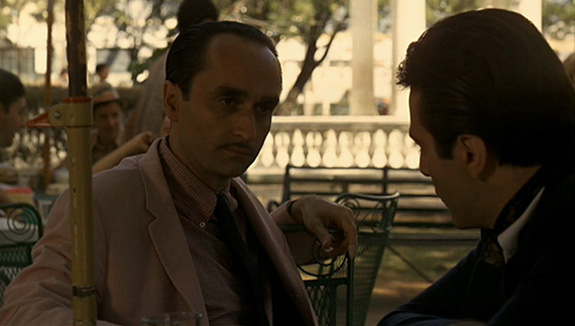
JOHN CAZALE as FREDO CORLEONE in THE GODFATHER PART II (1974)
Here we have an example of a performance that got lost in the shuffle while the movie that featured it was graced with countless praise and awards. John Cazale is considered today to be one of the greatest actors of his generation and he managed to be a featured player in many of the most beloved films of the 1970’s (Dog Day Afternoon, The Conversation, and The Deer Hunter). But, his best remembered role is that of Fredo Corleone in the The Godfather trilogy, with Part II being the film that really put him in the spotlight. When The Godfather Part II made it’s triumphant showing at the 1974 Oscars, nominated for 11 awards including five acting nods (3 alone in the Supporting Actor category), there was one very notable omission, and that was Cazale. Lee Strasberg and Micahel Gazzo were both nominated for their standout but minor roles, as was eventual winner Robert DeNiro as a young Vito Corleone. But, Cazale’s role as Fredo in the movie is the far more memorable one in the long run and has much more significance to the plot and it carries over much more from where he started in the first film. Sadly, it seemed that the flashier newcomers overshadowed his briliant work and Cazale was the odd man left out. Even still, he was well beloved by his peers and would continue to be given great roles in future movie. Sadly, his life was cut short by cancer while he was working on The Deer Hunter, so he never got another shot at a nomination. But the interesting thing about his career is that he only appeared in five films, and all five were nominated for Best Picture. He was a good luck charm in the end for these films, even if none of that luck fell back onto him.
9.
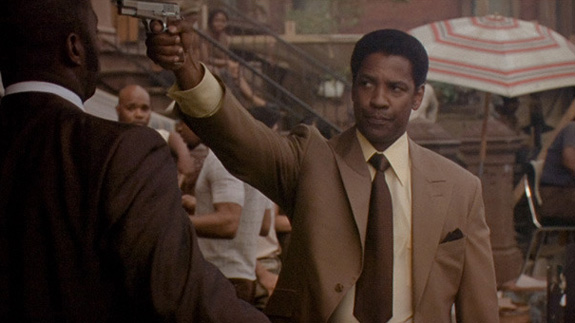
DENZEL WASHINGTON as FRANK LUCAS in AMERICAN GANGSTER (2007)
If there is something that is even worse than the Academy’s lack of foresight in their choices over the years, it’s their desperate attempts to correct their past mistakes, which can often lead to even more baffling choices. One pattern you see in the Academy’s history is the way that they give out Oscars based on whether it’s that Actor or Filmmakers turn or not. Often this is given out to an actor who has been overlooked for many years and has developed a groundswell of support from fans who are demanding that the Oscars finally take notice, and that leads to the eventual awarding of that said person (we are seeing this play out right now with Leonardo DiCaprio as I write this). While the actor is without a doubt deserving of an Award for many different films, there also is the unfortunate compulsion by the Academy to jump the gun in their decision and Award the actor for a less deserving role, just as a way to quickly right the wrongs of the past. I feel that this was the case with Denzel Washington when he won the Oscar for Best Actor for Training Day (2001). Is he good in that movie? Yes, but it’s far from being his best work. It was a showy performance, and one that the Academy responds quickly to, but it’s not representative of the actor’s talent. I felt that if the Oscars waited a couple years more, they would have found an even better performance to Award Denzel for in Ridley Scott’s American Gangster. In this movie, Denzel shows what he’s best at and that’s a cool, measured intensity, something which he also showcased in Spike Lee’s Malcolm X (1992). It’s one of his best roles ever, but because he already got his turn with Training Day, this role was sadly overlooked despite deserving at least a nomination. In the end, timing became it’s biggest fault.
8.
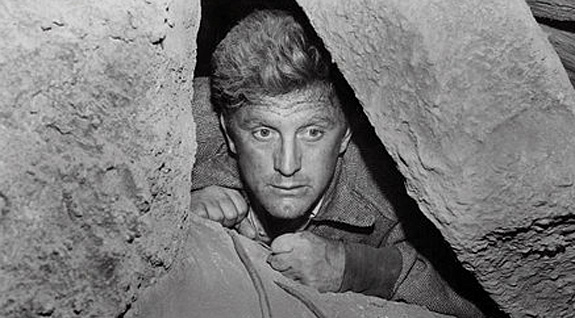
KIRK DOUGLAS as CHUCK TATUM in ACE IN THE HOLE (1951)
It’s hard to believe that in all the 99 years that Kirk Douglas has walked this Earth (as of this writing) he has never won an Academy Award; at least not competitively (he given an honorary award). Though nominated a couple times, the Academy sadly never gave him the Golden Boy, despite being one of the biggest stars in Hollywood. Some of his nominations were no-brainers (1952’s The Bad and the Beautiful), but some of his omissions were pretty egregious (1960’s Spartacus). But I think his biggest overlooked role was also his greatest overall, and that’s the one in Billy Wilder’s Ace in the Hole. Ace probably fell victim to an outdated point of view on the Academy’s part, because the main character that Douglas plays in the film is no hero, and is in fact very unlikable. Perhaps the Academy was not keen on nominating an anti-hero role like this, but as time has gone on, this kind of character is exactly what appeals to the Academy today. The shaky morality of Kirk Douglas’ Chuck Tatum is fascinating to watch, seeing just how far the actor will go to become unlikable by the end; it was a gamble on Douglas’ part and he pulls it off extraordinarily well. Today, you can see shades of this kind of character in Oscar Winning performances from Faye Dunaway in Network (1976) and from Kirk’s own off-spring Michael Douglas in Wall Street (1987). Had Ace in the Hole had not been released in the less cynical, more moralistic 1950’s it might have been Kirk Douglas’ best shot at winning an Oscar. Unfortunately, it stands as a standout performance that was too ahead of it’s time.
7.
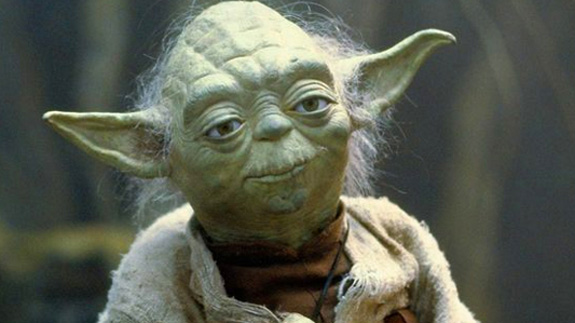
FRANK OZ as YODA in THE EMPIRE STRIKES BACK (1980)
Apart from the Academy’s bad sense of timing, which can be accidental, there is also the valid complaint that they can be snobbish towards certain types of movies and certain types of performances. Genre films are especially ignored by the Academy, and they tend to favor performances that are not quirky and are grounded in reality. That’s why you see so many winning performances from actors playing real life figures as opposed to original creations, because I guess that the Academy believes that the key to acting is the art of imitation. But, what I find particularly disheartening is when they dismiss a great performance purely because it’s a non traditional form of acting, as was the case with puppeteer and filmmaker Frank Oz’s amazing work as Yoda in Star Wars Episode V: The Empire Strikes Back. Yes, Oz is performing through a puppet as opposed to himself on screen (along with his own voice), but there is talent in bringing a puppet to life and it takes a certain amount of acting skill to pull it off. His work as Yoda is nothing short of astounding, making the Jim Henson Company created creature feel absolutely real and alive. Not only that, one would argue that it gives one of the most lively and heartfelt performances in the movie overall. Sadly, it was not nominated because the Academy saw the character of Yoda as a special effect, and not as a performance. For the Academy to overlook this purely because they don’t view this as real acting is unfortunate and I’m not the only one who thinks this. George Lucas himself appealed to the Academy to get Frank Oz a nomination for his work here, but it was sadly for not. Even still, regardless of what the Academy thinks, Frank Oz gave a standout performance as Yoda and it’s one that remains beloved today. Indeed, even a special effect can display real emotion, just like any other actor.
6.
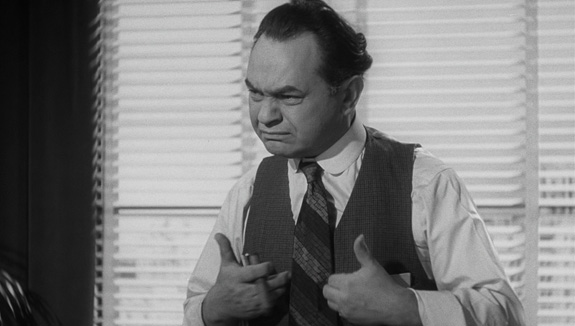
EDWARD G. ROBINSON as BARTON KEYES in DOUBLE INDEMNITY (1944)
If one were to pick out the most overlooked Actor in the history of the Academy Awards, it would be Edward G. Robinson. The versatile actor had an astounding career that spanned five decades in Hollywood, appearing in countless movies, many of which are considered classics today, from Little Ceaser (1931) to Soylent Green (1973). And all that amazing work resulted in zero nominations for his entire career. Sadly, the Academy rarely awards performers who fall under the character actor category. These are the kinds of actors who give valued support and memorable characterizations to many classic films, but rarely are the headlining star, and Robinson is often hailed as one of the greatest ever in this category. Out of all the overlooked performances he gave over his career, the one that sticks out as particularly dubious on the Academy’s part is his role in the great noir classic Double Indemnity. As Insurance agency manager Barton Keyes, Robinson takes command of every scene that he’s in, often outshining his costars Fred MacMurray and Barbara Stanwyck (who was nominated). One scene towards the middle in particular, where Robinson rattles off every insurance claim category he knows without a single break in between, is a singular tour-de-force of acting, and yet no nomination. I’m sure that this is one performance that even the Academy itself would admit they should’ve remembered. Regardless, Edward G. Robinson is still a valued icon of Classic Hollywood. Towards the end of his life, that value did earn him the spotlight and the Academy rightly awarded him an Honorary Award. Sadly, he passed away in 1973 only days after learning he had been given the honor.
5.
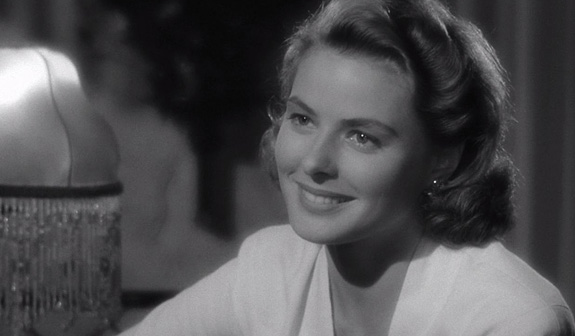
INGRID BERGMAN as ILSA LUND in CASABLANCA (1943)
Casablanca is rightly considered one of the greatest movies ever made and is still a highly influential production. It was also a situation where the Academy got the timing right, at least for most of the categories. Though produced at a time when other movies of the same ilk were flooding the marketplace, the Academy recognized that Casablanca was far superior to the rest and rightly rewarded it with Best Picture, as well as Director to Michael Curtiz and for Best Screenplay, recognizing the film for it’s high quality film-making. Humphrey Bogart and Claude Rains both received deserved nominations, but there was one glaring omission that year that has only grown more peculiar the longer this movie gains more legendary status, and that’s the lack of a nomination for actress Ingrid Bergman, the film’s female lead. Though Bogart is the focus of the film, there’s no doubt that Bergman’s Ilsa is the heart, and her stunning screen presence is usually what people take away most from the movie. Not only that, but it was a star making role for her, announcing to the world that she was a matinee idol worth raving about. She exuded beauty, charisma, as well as strength in the key role of Ilsa and made the audience believe that she was indeed the kind of girl that the fate of world peace would hinge upon. All of that should have earned her a nomination in a movie that was already destined for Oscar glory, but it sadly did not turn out that way. Bergman would be redeemed with 3 Oscar wins over her long career, including one the year after for 1944’s Gaslight. But, sadly the role she is best remembered for is also the one that the Oscars left out. Thankfully, it’s a role that stands on it’s own without it.
4.
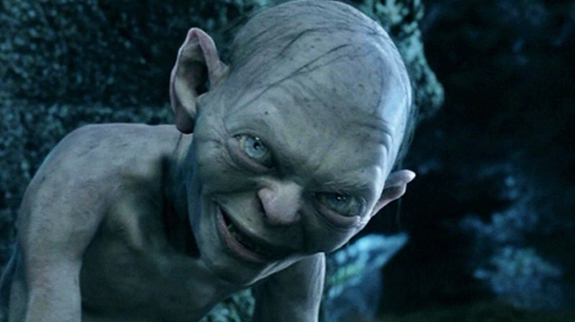
ANDY SERKIS as GOLLUM in THE LORD OF THE RINGS: THE TWO TOWERS (2002)
Like Frank Oz’s Yoda before him, the Academy likewise seemed to view the character of Gollum as just a special effect and not a real performance by an actor. But that claim feels incredibly dismissive with regards to what director Peter Jackson and actor Andy Serkis accomplished with the character. In The Lord of the Rings trilogy, Jackson and company broke new ground in the advancement of CGI animation, and no more so than in the field of motion capture animation. Andy Serkis believed that he was initially just cast as the voice of Gollum, but he soon learned that Peter Jackson intended him to be an on set presence in every scene with the character interacting with the other actors. Through his movements, the animation team were then able to puppeteer a digital model of the creature Gollum and the end result is an amazingly lifelike character that feels like it’s a part of the real world. Peter Jackson loved Serkis’ work so much on set that he publicly shared the untouched footage of the actor on set, showing just how much of a real performance he gave as an actor. It’s particularly astounding when you watch the dual personality conversation scene from The Two Towers, and just how much Andy Serkis’ facial expressions and mannerisms are faithfully transplanted into the CGI Gollum. Sadly, the Academy didn’t seem impressed, and Andy Serkis’ breakthrough role was overlooked. in the years since, Serkis has continued to champion the practice, playing other amazing motion-captured characters as the medium continues to be refined, like King Kong and Ceasar in the Planet of the Apes reboot, showing that this is indeed acting just like in any other form. Gollum still remains his signature role and it’s one omission that I hope the Academy will ultimately regret passing on.
3.
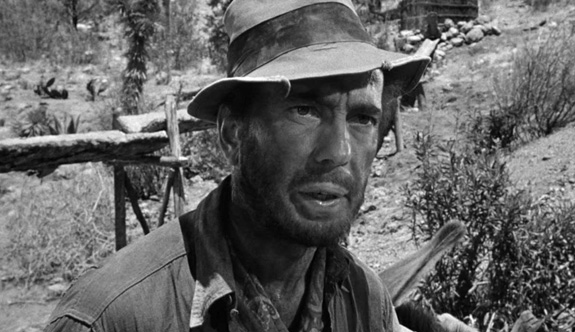
HUMPHREY BOGART as FRED DOBBS in THE TREASURE OF THE SIERRA MADRE (1948)
A lot of the performances I’ve highlighted have resulted in the Academy either ignoring them purely out of bad timing or by unfair standards. This particular omission is one of the more baffling because it’s the exact kind of performance that the Oscars should have gone crazy for, and yet they didn’t. Bogart at the time of the film’s making was one of the biggest stars in Hollywood and had been honored with many accolades, including a nomination for Casablanca. When The Treasure of Sierra Madre was released, Bogart’s performance was heralded as his best yet, and to this day it’s widely considered to be the best performance of his career. With praise surrounding his role, and the fact that he had yet to win the Award, you would think that he was due for the honor finally, or at least be considered with a nomination. Well, when the nominations were announced, the film was recognized in the Best Picture category, as well as for Director John Huston and Supporting Actor Walter Huston (both of whom ultimately won their awards). But shockingly Humphrey Bogart was left out. Did the academy just forget and run out of room in the category, or was Bogart’s intense performance as the greedy and amoral Fred Dobbs too dark for their tastes. It’s hard to know why, but it’s odd today to see what is widely considered to be one of the greatest performances in movie history be completely ignored by Hollywood’s highest honor. Bogart thankfully won a deserved Oscar a couple years later for The African Queen (1951), but it’s an honor that he shouldn’t have had to wait so long for.
2.
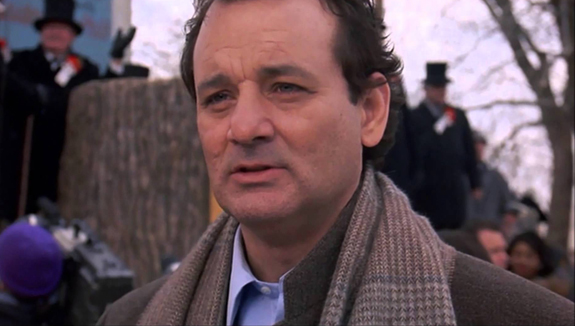
BILL MURRAY as PHIL CONNORS in GROUNDHOG DAY (1992)
One actor who’s developed a ground swell of support from fans who want to see him win an Oscar has been Bill Murray. The Saturday Night Live alum and beloved comedic actor did finally gain a nod for his work in Sofia Coppola’s Lost in Translation (2003), but I believe that fans’ (myself included) desire to see him win the Award stems more from this movie than anything else. Groundhog Day has rightly become a beloved classic of both comedy and fantasy, and at it’s center is a remarkably nuanced performance from Murray himself. Yes, the movie does play upon his comedic talent, but it goes even deeper than that, taking Murray’s acting abilities into some dark and sometimes personal places. Murray’s Phil Connors is a very Capra-esque hero, someone who becomes a better person when he learns to think less in his own interests and more about those around him, and Bill Murray brings that out perfectly. It’s a deeper characterization that doesn’t really fit in with most other categories that the Academy usually goes crazy for, which might have explained why it was overlooked at the time. That and the fact that the movie was released early in the calendar year and comedic performances tended to be devalued by the Academy. But, in the years since, people have recognized that Murray’s work in the film is not only Oscar-worthy, but might be one of the best performances of that era in film history. It certainly has made many of his fans vocal about their desire to see him eventually win an Award. Hopefully a role will come along in the years ahead that finally answers their prayers. Regardless, Bill Murray’s work in Groundhog Day is certainly one of the best overlooked by the Oscars.
1.
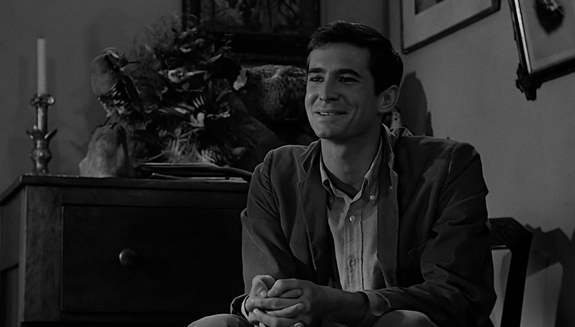
ANTHONY PERKINS as NORMAN BATES in PSYCHO (1960)
Of all the performances that the Oscars have overlooked that I’ve highlighted, I would say that this is the most perplexing. Some of the previous ones had other factors that caused them to be ignored, but Anthony Perkins’ omission was just out of plain ignorance. Here you have a breakthrough, nuanced performance in what would become one of Hollywood’s most iconic characters in a classic movie from one of the industry’s most filmmakers. Sadly, Perkins was left out of a nomination that he would almost certainly had run away with. This was unfortunately a trend with Hitchcock films, with both Jimmy Stewart and Cary Grant both being overlooked by the Academy for their career best work in Vertigo and North by Northwest respectively. But as great as they were, none were as memorable as Norman Bates; one of the most fascinating villainous characters to ever be put on screen. The brilliance of Perkins’ performance is the subtlety, helping to deceive the audience about what is truly going on with the character. It’s a performance that not only stood out in the film, but would help redefine cinema as a whole. Hitchcock’s Psycho redefined the character of a Hollywood murder mystery,as well as redefined what makes a person villainous, and with Norman Bates they showed that the good-natured boy next door could be the monster in the end. It’s a monumental performance by the perfectly cast actor, and sadly the Oscars didn’t recognize that significance at the time. In the years since, the Academy has been kinder to darker and more sinister performances, like Anthony Hopkins in The Silence of the Lambs (1991) or Kathy Bates in Misery (1990), but they’re unfortunately opportunities that opened up as a result of this overlooked performance that made a difference. That’s why it stands as the Academy’s most baffling omission of all time.
So, though the Oscars unfortunately must live and die by their restrictive standards that limit the nominations given out each year, it doesn’t mean that the performances left out are doomed to be forgotten forever. The Academy Awards are really just a time capsule of how the industry reacts in the moment, and are not a reflection of how the movies will stand over time. Some of the best movies ever made have become so without winning a single award, and some actors and filmmakers have become legends without ever holding an Oscar in their hands. But, there are those cases where you just look at the snubs over the years and you wonder what on Earth was the Academy thinking. Sometimes an actor’s best work is overlooked and is later made up for by awarding them for a lesser film, which is another unfortunate result of the Academy’s sometimes blind ambition to appear relevant to contemporary tastes. But, there are other times when the industry is moving too fast for them and new types of acting roles push the boundaries of what is considered acceptably worthy in the industry, like say acting through a special effect. The Academy sometimes tries, and can often get somethings right, like honoring African-American actors long before Civil Rights became the norm in society or honoring Tom Hanks humane performance as an AIDS stricken man in Philadelphia (1993) at a time when the disease still carried a stigma around it. But, when you are limited to only a handful of nominations a year, some worthwhile choices are inevitably forgotten, some more egregious than others. The only reason we take this so seriously is just because of the Oscar legacy, which if you look at the whole of film history, it shouldn’t matter all that much. Even still, with some of these choices on this list, it would have been nice to have seen the Academy share the honors where they were deserved.